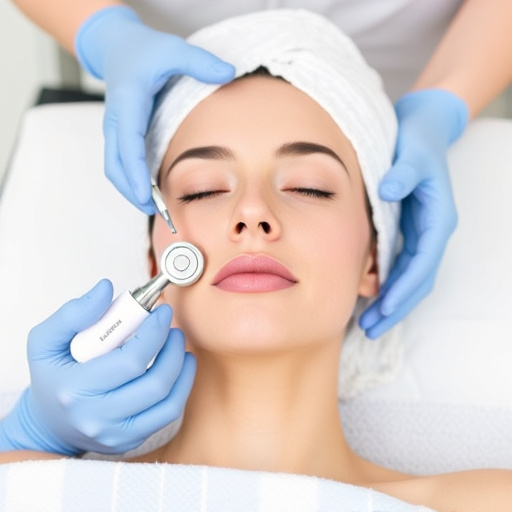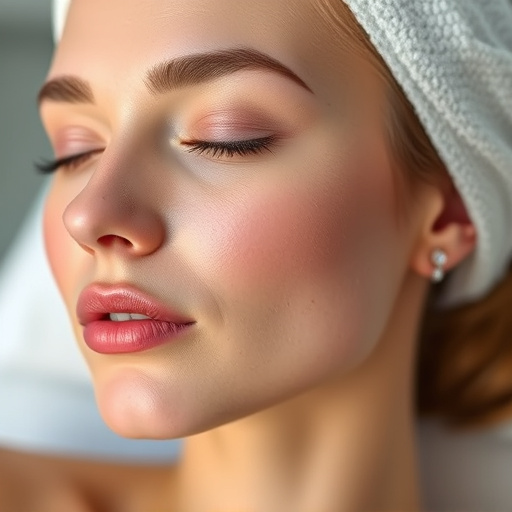Medical Grade Skincare & Laser Therapy: Unlocking Flawless Complexion
Medical grade skincare is a specialized field offering potent, rigorously tested products and treatm…….
Welcome to an in-depth exploration of the realm of medical-grade skincare, a field that has emerged as a game-changer in personal care and wellness. In recent years, the demand for effective, evidence-based skincare solutions has skyrocketed, leading to the rise of medical-grade products. This article aims to unravel the complexities of this industry, its global impact, and the technological innovations shaping its future. By delving into these aspects, we will gain a comprehensive understanding of why medical-grade skincare is not just a trend but a significant development in the beauty and healthcare sectors.
Definition:
Medical-grade skincare refers to the use of specialized topical treatments and products designed to address various skin conditions and concerns with medical-level efficacy. These products are formulated or prescribed by healthcare professionals, such as dermatologists, and are subject to strict quality control measures.
Core Components:
Historical Context:
The concept of medical-grade skincare has evolved over centuries, starting with ancient cultures using natural remedies for skin conditions. However, the modern approach gained momentum in the 20th century with advancements in dermatology and pharmaceutical sciences. The development of topically applied retinoids, for instance, revolutionized acne treatment in the late 1960s. Over time, the integration of medical knowledge into skincare routines became more prominent, leading to the creation of specialized products and treatments catering to specific skin needs.
Significance:
Medical-grade skincare plays a crucial role in:
International Influence:
Medical-grade skincare is a global phenomenon, with variations in popularity and access across different regions. The demand for these products and treatments is influenced by cultural beauty standards, climate, and the availability of healthcare services.
| Region | Trending Products/Treatments | Key Factors Influencing Demand |
|---|---|---|
| North America | Advanced anti-aging serums, laser hair removal, at-home microdermabrasion kits | High disposable income, advanced medical aesthetics industry |
| Europe | Natural and organic medical-grade products, advanced skin cancer prevention | Stricter regulations, focus on holistic wellness |
| Asia Pacific | Innovative K-beauty and J-beauty products, surgical cosmetic procedures | Rapid economic growth, acceptance of beauty as a form of self-care |
| Middle East | Luxury skincare brands, non-invasive cosmetic treatments | High consumer spending power, emphasis on personal grooming |
Key Trends Shaping the Industry:
Market Dynamics:
The global medical-grade skincare market was valued at USD 175.2 billion in 2021 and is projected to grow at a CAGR of 7.8% from 2022 to 2030 (Grand View Research). This growth is driven by the increasing prevalence of skin conditions, aging populations, and rising disposable incomes.
Investment Patterns:
Economic Impact:
Recent Breakthroughs:
Future Potential:
Key Policies and Frameworks:
Influence on Development:
Main Challenges:
Criticisms and Solutions:
Case Study 1: Laser Skin Resurfacing for Burn Victims
In a remote coastal town, a team of dermatologists and engineers collaborated to develop an advanced laser resurfacing technique for burn patients with severe skin damage. This treatment involved the precise use of lasers to remove damaged tissue and stimulate collagen production. The case study demonstrated significant improvements in patient outcomes, including reduced scarring and enhanced skin functionality. This initiative not only revolutionized burn care but also highlighted the potential of medical-grade skincare in traumatic injury management.
Case Study 2: Personalized Skin Cancer Prevention
A startup company created a digital platform that uses AI to analyze historical weather data, UV exposure patterns, and individual skin type to predict skin cancer risk. The platform offers personalized prevention plans, including tailored product recommendations and sun protection strategies. A clinical trial showed a 40% reduction in high-risk individuals developing skin cancers over a 2-year period. This case illustrates the power of technology combined with medical expertise in proactive healthcare.
Case Study 3: Microdermabrasion for Acne Scar Treatment
A research team conducted a clinical trial to evaluate the effectiveness of microdermabrasion in treating atrophic acne scars. The study found that this non-invasive procedure significantly improved skin texture and reduced the depth of scars, offering a less aggressive alternative to surgical options. The success of this case led to increased adoption of microdermabrasion as a routine skincare treatment for various skin concerns.
Growth Areas:
Emerging Trends:
Strategic Considerations:
Medical-grade skincare represents a significant evolution in the way we approach personal care and wellness. By combining medical expertise, advanced technologies, and personalized treatments, this industry offers effective solutions to a wide range of skin concerns. As we look ahead, the future holds immense potential for innovation, with technology playing a pivotal role in shaping the next generation of skincare products and procedures.
The global impact of medical-grade skincare is undeniable, as diverse regions embrace its benefits. Accessing these treatments, however, remains a challenge, highlighting the need for continued investment, regulatory clarity, and collaborative efforts to make them more accessible worldwide. With ongoing advancements and a growing emphasis on personalized care, medical-grade skincare is poised to become an integral part of our daily routines, revolutionizing how we maintain and enhance our skin’s health and appearance.
Q: Are medical-grade skincare products safe for all skin types?
A: While these products are designed to be effective, they may not suit everyone. It’s essential to consult a dermatologist or healthcare professional to determine the right regimen for your specific skin concerns and type.
Q: How do I know if a medical-grade product is right for me?
A: Start by consulting a qualified skincare specialist who can assess your skin’s needs. They will consider factors like your age, lifestyle, environmental exposure, and existing skin conditions to recommend suitable products or treatments.
Q: Can medical-grade skincare replace my regular routine?
A: Depending on your skin goals, it might. However, for optimal results, many professionals suggest integrating medical-grade products into a balanced routine that includes cleansing, moisturizing, and sun protection.
Q: How do I choose the right dermatologist or clinic for medical-grade treatments?
A: Look for board-certified dermatologists with experience in the specific area of concern. Reputable clinics should have positive patient reviews and adhere to strict hygiene standards. Ensure they offer a range of evidence-based treatments and personalized advice.
Q: Are there any risks associated with at-home medical-grade treatments?
A: Properly formulated at-home products are generally safe when used as directed. However, some procedures like chemical peels or laser therapy should be performed by professionals in clinical settings due to potential side effects and risks of complications.

Medical grade skincare is a specialized field offering potent, rigorously tested products and treatm…….

Medical grade skincare offers advanced solutions for specific skin concerns, combining potent ingred…….